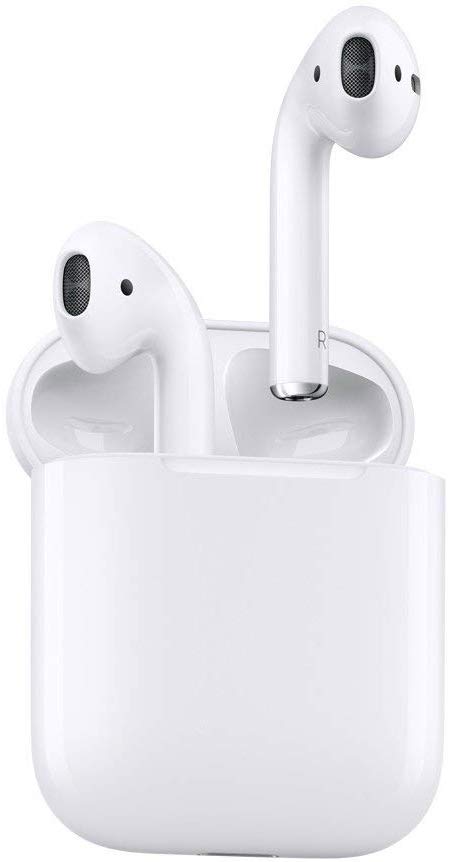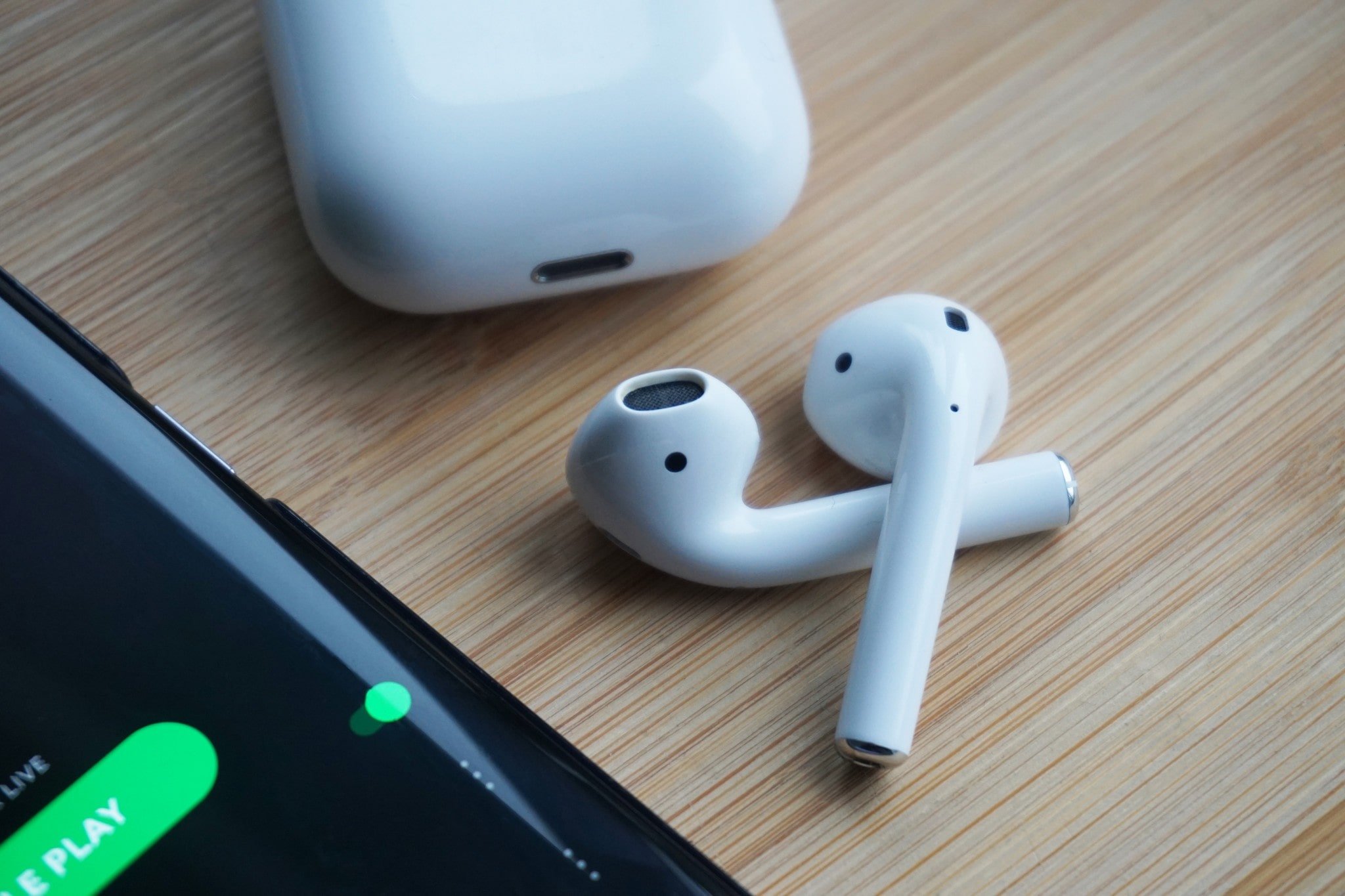Familiar take
Google Pixel Buds A-Series
Pros
- Same sound quality for less
- Integration with Android and Google Assistant
- Lightweight build and comfy fit
- Fast charging
Cons
- No swipe gestures
- No wireless charging case
- No change in battery life
- Still no active noise cancelation
Google brought its Pixel Buds back, only instead of an improved sequel, it opted for a more affordable variant. The A-Series leave a few things behind, but the major pieces are still in place, and that's what makes them such an attractive target for your ears.
Original make
Apple AirPods
$150 at Amazon From $120 at Best Buy From $120 at Walmart
Pros
- Great microphone quality
- Super compact design
- Wireless charging case
- Up to 24 hours battery life with case
Cons
- Poor sound isolation
- No easy media controls
- No customizability on non-Apple devices
- More expensive
Apple breathed real life into the wireless earbuds category with the AirPods, and they continue to be ubiquitous because of their convenience. However, they no longer carry the same weight among other pairs because the sound quality and passive noise isolation could be better.
Google vs. Apple makes for nice headlines, though this particular duel isn't quite as dramatic as others. The Pixel Buds A-Series are a budget play for Google, which looks to carve out whatever piece it can from the competitive wireless earbuds market. It's the market that Apple has been leading with the AirPods, though these entry-level buds are less about actual function and more about marketing and ecosystem.
Google Pixel Buds A-Series vs. Apple AirPods: What sets them apart?
It seems like these two earbuds have a lot in common when looking at them on a spec sheet. With the same battery life, drivers, and connectivity, the real dividing line between them might just be their respective ecosystems. That's certainly true on the face of it, but the real story says so much more. The AirPods have long been overshadowed by the AirPods Pro as one of the best wireless earbuds, yet they're easier to spot.
The A-Series was looking to take on the likes of the AirPods, albeit at a cheaper price. That value proposition is what makes this comparison all the more interesting because you weigh the benefits of what you get based on how well they sound and how little they cost.
| Google Pixel Buds A-Series | Apple AirPods | |
|---|---|---|
| Durability | IPX4 | N/A |
| Bud battery life | 5 hours | 5 hours |
| Case battery life | 24 hours | 24 hours |
| Wireless charging case | No | Yes (optional) |
| Connectivity | Bluetooth 5.0 | Bluetooth 5.0 |
| Digital assistant support | Google Assistant | Siri |
| Supported audio codecs | SBC, AAC | SBC, AAC |
| Speaker size | 6mm drivers | 6mm drivers |
| Active noise cancelation (ANC) | No | No |
| Ambient sound mode | Not exactly | No |
To get there, Google did remove some features from the Pixel Buds (2020) to place them in more affordable territory, but the audio features are largely intact. You won't be able to swipe on the outside of the earbuds to adjust volume, nor will the A-Series buds pause as fast when you remove one from your ears. The bigger cut may have been in taking out wireless charging from the case. The only way to charge it back up is through a USB-C cable. Fast charge for 15 minutes to get up to three hours of playback.
The AirPods are no more capable as far as features go. There is quick pairing with iOS devices, but you lose out on that once you try pairing them with an Android device. The touch controls on the outer shell are hardly any better, and battery life also holds no advantage. You do have the option of going with a wireless charging case so long as you're willing to pay extra to get it. If you go with the wired option, you have to charge via Lightning.
It's when the audio starts that the differences become more apparent.
It's when the audio starts that the differences become more apparent. Google offers limited tools to customize or steer the sound signature in any particular direction. Bass Boost is exactly as it sounds, but there's no equalizer beyond that. Apple does try to remedy that with an equalizer under the settings on an iPhone, which you won't find on an Android device because the AirPods don't have their own dedicated app. These are preset modes, rather than a multi-band EQ, but not having a modicum of options can feel very limiting.
And it is limiting, considering the AirPods just don't sound very good. There's a lack of verve to start with, and because they don't use ear tips, getting a good seal is difficult. The Pixel Buds A-Series aren't world-beaters in sound unto themselves, but at least you have some way to impact the audio coming out of them. It starts with the fit, which is more maneuverable because of the tips, as well as how they sit in your ears.
Neither pair offers anything like active noise cancelation (ANC), and the closest the Pixel Buds A-Series come to an ambient mode is Adaptive Sound, which raises or lowers volume based on how much background noise is going on around you. Take off one of the earbuds, and the audio pauses. The AirPods will auto-play/pause, and are quite good at it, though you won't get any sort of ambient sound feature like you get with the AirPods Pro.
Google Pixel Buds A-Series vs. Apple AirPods: Assistant on demand
Not surprisingly, voice assistant integration is going to be a factor here. Except there's one important caveat: They're anchored to their respective platforms. Use the Pixel Buds A-Series on an iPhone and it won't be the same as on an Android device. It's the same with the AirPods on Android. Google Assistant is easy to wake up when using the A-Series on an Android phone, much like Siri is quick to respond with the AirPods paired to an iPhone.
For that reason alone, the Pixel Buds A-Series are the better option for Android users who want that kind of quick interaction. Calling someone is as easy as saying, "Hey Google, call Jim," without ever touching the phone or the earbuds. You can't do that with the AirPods on an Android phone.
Google Pixel Buds A-Series vs. Apple AirPods: Getting on a call
Phone calls have been one consistently good performance metric for the AirPods. They did better on calls than most when they first came to market, forcing others to follow suit and take the microphones more seriously. Since then, many have caught up, so in this matchup, the gap isn't very large.
Despite lacking the stem that droops downward from the ear, the Pixel Buds A-Series are no less capable of handling phone calls. Callers should be clear, and hear you clearly as well. The challenge in both pairs is they don't have ANC to block out the noise and amplify voices for clearer calls in more situations.
Google Pixel Buds A-Series vs. Apple AirPods: Which one should you go with?
If you're an Android user, the answer is pretty clear. The Pixel Buds A-Series were built to integrate with Android in ways that even other third-party earbuds could never do. Apple made the AirPods to do just that with its own ecosystem of products, and that divide is what sets the two further apart. When comparing two products that largely exist to supplement other products the company makes, crossover appeal isn't going to reach very far.
The A-Series have other advantages in that they cost less, can do more, and are easy to use. They're inexpensive enough to find themselves in the conversation among the best cheap wireless earbuds, which I could never recommend the AirPods for, even if they did cost the same.
Easy to listen to
Google Pixel Buds A-Series
Google's budget buds
Google's follow-up to its Pixel Buds trim a few features, but leave the most important elements intact for greater affordability.
Easy to find
Apple AirPods
Apple's own earbuds
$150 at Amazon From $120 at Best Buy From $120 at Walmart
Everyone recognizes the AirPods, and while convenient in some ways, they aren't the best option when you want good sound or are on Android.





0 Commentaires